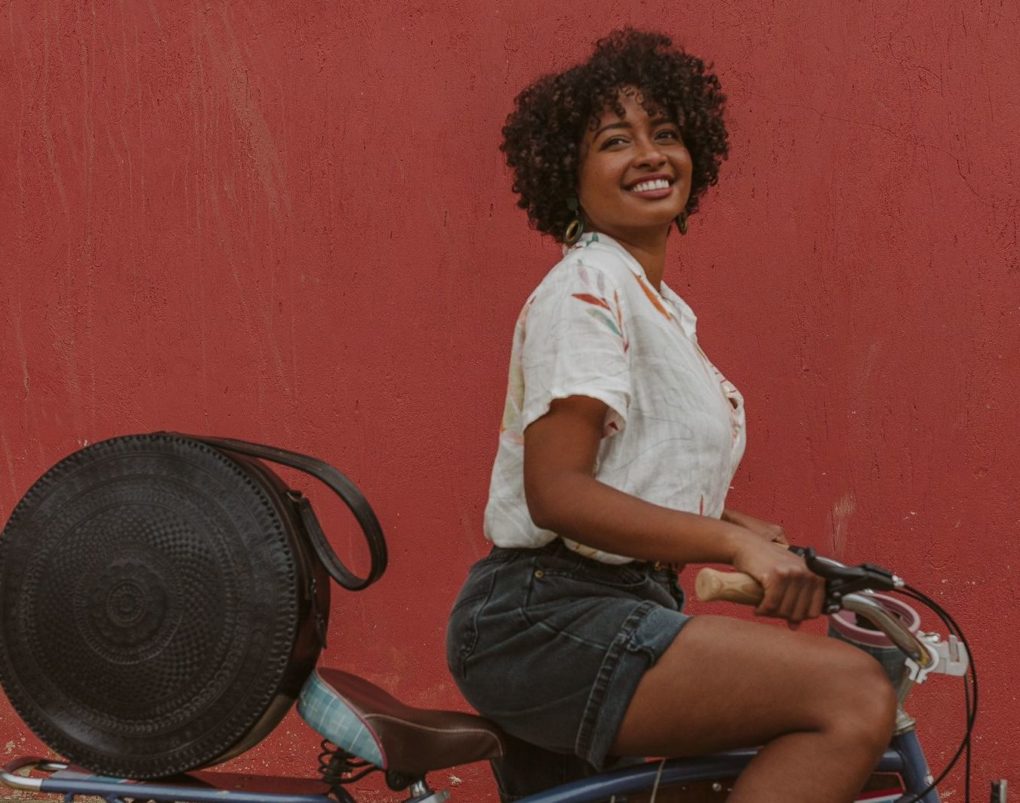When Ibérica Rivera’s plans to move to NYC fell through, she found herself having to realign which led her to a series of unimaginable and affirming connections with Afro-Mexicans.
From making patacones with the Afro-Mexican community in Chacahua to resting in the freshness and solitude of the mountains of San Cristóbal de las Casas, find out how cancelled plans turned into a whole new life for Ibérica.
Could you tell the Travel Noire community who you are?
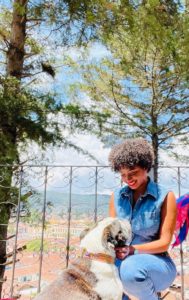
I am Ibérica Rivera, an African Indigenous woman originally from Cartagena, Colombia. I’m also American by adoption and currently living in Mexico.
I describe myself as a multidisciplinary creative. My focus has been in the field of marketing for the past 10 years, but within that I have been able to express my creativity in many ways. I’m also in this big transition of moving to a new country, and so I’m reinventing myself.
As an entrepreneur, I am working on a few projects in the food industry as well as in the tourism industry. Eventually I want to take a moment in my life to focus on fashion. As you can see, I don’t see myself doing one thing for the rest of my life, but I see myself playing with life and doing things that bring me joy in all parts of myself.
And I’m also a dog mom! My dog is called Cyrus the Great Bulldog.
So let's talk New York... what was the original plan?
Yes, that was one of those 2020 twists. I had a happy life in New Orleans, but I like to follow my intuition, it is honestly how I make most of my decisions. My intuition was telling me to move to New York. At that time, I was already thinking about making a transition in my career into fashion and where better than New York – that was my dream, but because I was so happy New Orleans, I wasn’t so sure.
In early 2020 everything lined up for me to move on March 15, 2020. Everything was going relatively smoothly, I was receiving all the clarity that I had asked for. Originally I was going to stay with my cousins in Connecticut but on my way to Connecticut, everything changed in the world.
Another plan I had was to take a vacation somewhere in the tropics or Mexico before I made the transition, and this was put on pause too as flights were being cancelled and borders closed. I got stuck at my cousin’s for lockdown.
After some time being locked-down in Connecticut, I had to find my own place and decided to head over to Puerto Rico, which was really the start of life-changing connections and friendships.
What life-changing events happened in Puerto Rico?
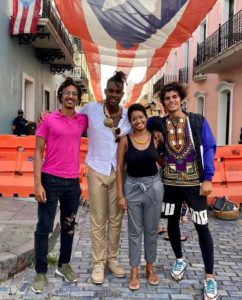
I met this couple through some friends who had a baby boy taken away by the agencies in the U.S. who are supposed to protect kids, but a lot of time abuse their power. We were part of starting a movement to help baby Messiah come back to his family, which after less than a whole two years happened. Finally, he’s back with his family where he belongs. At the time it was a whirlwind that my life had changed so much through activism in Puerto Rico.
I actually ended up heading to New York in Summer 2020. I bought a storage unit in Harlem because I was convinced that I was gonna be right back…
I picked up Cyrus the Great Bulldog and ventured out to Mexico before what I thought would be my new life in New York.
How did it feel to transition to life in Mexico?
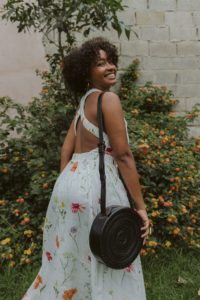
It was kind of fundamental for me because for the most part, I spent a lot of time by myself. I needed it after everything in Puerto Rico. I just rented a bike, and I’d go to the beach.
Initially, I spent a month practically in my own space in Tulum having the most extraordinary solo experiences, and then I moved to San Cristóbal de las Casas in Chiapas.
They are such different locations, why did you feel drawn to Chiapas?
My soul still needed some alone time, so spending time in the mountains was perfect. I didn’t really come down from the mountains, I would go on walks and runs and just see a farm lady with her goats like every other day, it was so different.
The house I stayed in was owned by an anthropologist and the house was so beautifully decorated. There was a fruit garden, a flower garden and the lady who cooked for the owner made beautiful vegetarian dishes and I would pay her to cook for me because she made incredible dishes from all over the world. When I left I actually cried because I knew I was going to miss them, they had become family.
I can imagine. There isn't anywhere that matches the energy and warmth in San Cris.

Exactly. I really felt this, but I moved to Oaxaca, because I felt pulled and life was completely the opposite in Puerto Escondido!
At first, I started to take the time to be more disciplined and maintain my routine from the mountains. I wanted to keep waking up at 5am, going for an early run, meditate and generally build good habits. Very quickly, I realized that the strict routine that I had for myself wasn’t going to work. The environment was telling me that I went there to actually just relax and loosen up. I spent most of my early twenties taking myself so seriously. I was in a very serious relationship that honestly wasn’t for my highest good and in general I just wasn’t relaxed.
Here I was in Puerto Escondido, learning how to take it easy. In the first week I met the owner of the building I lived in and his daughter. We were in complete party mode. I did a lot of partying, and it was so much fun and so needed for my nervous system and also for my spiritual practice.
This is something I don’t think New York could have given me. I was going to New York to make my dreams a reality, my mentality was fixed on the hustle and the go-getter pace of life, but maybe I didn’t really need that when I thought I did. You know what I mean? Not to say that there isn’t something to that, but maybe it would have been excessive and not really what I needed to thrive.
Where did life take you after slowing down in Puerto Escondido?

So I ended up extending my stay for some months, originally not knowing why, until I met the most amazing sisterhood ever. As soon as I saw them in Puerto Escondido, I knew why I kept extending my stay – I was supposed to meet them!
After many recommendations from friends and complete strangers, we ended up heading to Chacahua, another coastal town in Oaxaca. I was so excited to go because everyone I met in Puerto told me how Chacahua is a town with a lot of African descendants. From the moment we landed, it was so special. We saw the beautiful bioluminescence in the lagoon, and it literally felt like we were swimming in the star-lit sky at night.
Then an unforgettable experience I had was at a restaurant named Isahmar in Chacahua where the restaurant owner saw me and immediately called me her niece. She was a beautiful Afro-Mexican woman who wasn’t used to seeing African travelers, especially not an Afro-Latina like myself. She almost couldn’t believe that there were people who looked like her in Colombia. The owner of the Isahmar also featured in a movie called ‘La Negrada’, highlighting her pride in her Afro-Mexican identity.
I remember I asked if they had patacones, which is a smashed plantain dish found in the Caribbean and also in Colombia, but they didn’t know what it was or how to make it. They told me that they didn’t have it on their menu, but they did have plantain, so they invited me to prepare it with them to teach them. It was one of the best travelling experiences of my entire life. It’s really gonna be hard to top that because it was just this connection that was beyond food.
Cooking connected us at a deeper, ancestral level. There was so much love in the room, and we made the most delicious patacones, I hope they still keep it on their menu.
That is such a precious travel memory. How did that experience in Chacahua change or guide the rest of your trip?
Prior to Chacahua, I hadn’t had the opportunity to spend much time with the Afro-Mexican community, as they are mostly situated on the outskirts. I actually decided to stay longer and spend New Years with an Afro-Mexican family. I got to connect with more people and witness their simple, peaceful, mostly independent life in Mexico. It really filled my spirit to be able to connect with the diaspora in that way.
And now I’m living in Chiapas, a state with a really strong indigenous presence, and it just feels good. Nobody treats you less than, I don’t feel inferior. It’s a respite to my nervous system and when I am around Afro-Mexicans it is even stronger, I never felt anything like this living in the U.S.
What does life look like for you now and how do you feel about the way things turned out?
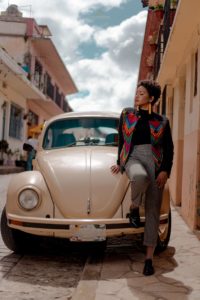
I feel totally grounded and fully rooted. I do still feel like I’m in a transitional period but maybe that is because I have been living in several countries.
My plans are to move to Mexico City, but to keep a home in Chiapas. I am working on a pet accessories brand with some artisans here in Chiapas. I’m also utilizing this leather that is grown here in Mexico – I say grown because it is made out of cactus. I have a few other creative projects, including my love for fashion, that I am excited about.
Being here in Chiapas there is a constant reminder to seek out sustainable practices when creating products. The lasting respect for Mother Earth and ancestral traditions is so easily felt here, and I am learning ways to create and live harmoniously with the Earth. I’m sure that I will carry these lessons with me for the rest of my life.
I’m glad I’m here in Mexico, for sure. Maybe this is something I would not have learned so quickly in New York but here it is essential; it is part of how you live life, and I’m so grateful to Mexico for that.
Keep up with Ibérica’s expat journey on Instagram.
